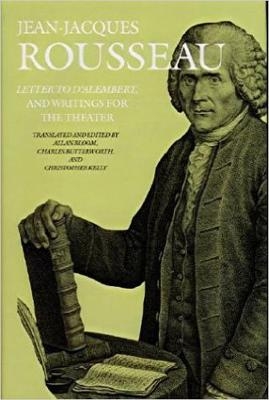
Letter to D’Alembert and Writings for the Theater
Seiten
2004
Dartmouth College Press (Verlag)
978-1-58465-353-0 (ISBN)
Dartmouth College Press (Verlag)
978-1-58465-353-0 (ISBN)
- Titel z.Zt. nicht lieferbar
- Versandkostenfrei innerhalb Deutschlands
- Auch auf Rechnung
- Verfügbarkeit in der Filiale vor Ort prüfen
- Artikel merken
In 1758, Jean Le Rond d'Alembert proposed the public establishment of a theater in Geneva and Jean-Jacques Rousseau vigorously objected. Their exchange, collected in volume ten of this acclaimed series, offers a classic debate over the political importance of the arts.
In 1758, Jean Le Rond d'Alembert proposed the public establishment of a theater in Geneva-and Jean-Jacques Rousseau vigorously objected. Their exchange, collected in volume ten of this acclaimed series, offers a classic debate over the political importance of the arts. As these two leading figures of the Enlightenment argue about censorship, popular versus high culture, and the proper role of women in society, their dispute signals a declaration of war that divided the Enlightenment into contending factions. These two thinkers confront the contentious issues surrounding public support for the arts through d'Alembert's original proposal, Rousseau's attack, and the first English translation of d'Alembert's response as well as correspondence relating to the exchange.
The volume also contains Rousseau's own writings for the theater, including plays and libretti for operas, most of which have never been translated into English. Among them, Le Devin du village was the most popular French opera of the eighteenth century while his late work Pygmalion is a profound meditation on the relation between an artist and his creation. This volume offers English readers a unique opportunity to appreciate Rousseau's writings for the theater as well as his attack on the theater as a public institution.
In 1758, Jean Le Rond d'Alembert proposed the public establishment of a theater in Geneva-and Jean-Jacques Rousseau vigorously objected. Their exchange, collected in volume ten of this acclaimed series, offers a classic debate over the political importance of the arts. As these two leading figures of the Enlightenment argue about censorship, popular versus high culture, and the proper role of women in society, their dispute signals a declaration of war that divided the Enlightenment into contending factions. These two thinkers confront the contentious issues surrounding public support for the arts through d'Alembert's original proposal, Rousseau's attack, and the first English translation of d'Alembert's response as well as correspondence relating to the exchange.
The volume also contains Rousseau's own writings for the theater, including plays and libretti for operas, most of which have never been translated into English. Among them, Le Devin du village was the most popular French opera of the eighteenth century while his late work Pygmalion is a profound meditation on the relation between an artist and his creation. This volume offers English readers a unique opportunity to appreciate Rousseau's writings for the theater as well as his attack on the theater as a public institution.
Jean-Jacques Rousseau (1712-78) was a leading Genevan philosopher and political theorist and one of the key figures of the Enlightenment.
| Erscheint lt. Verlag | 31.1.2004 |
|---|---|
| Sprache | englisch |
| Maße | 156 x 235 mm |
| Themenwelt | Literatur ► Biografien / Erfahrungsberichte |
| Literatur ► Essays / Feuilleton | |
| Literatur ► Lyrik / Dramatik ► Dramatik / Theater | |
| Kunst / Musik / Theater ► Musik | |
| Kunst / Musik / Theater ► Theater / Ballett | |
| Geisteswissenschaften ► Philosophie ► Geschichte der Philosophie | |
| Geisteswissenschaften ► Philosophie ► Philosophie der Neuzeit | |
| ISBN-10 | 1-58465-353-1 / 1584653531 |
| ISBN-13 | 978-1-58465-353-0 / 9781584653530 |
| Zustand | Neuware |
| Informationen gemäß Produktsicherheitsverordnung (GPSR) | |
| Haben Sie eine Frage zum Produkt? |
Mehr entdecken
aus dem Bereich
aus dem Bereich


